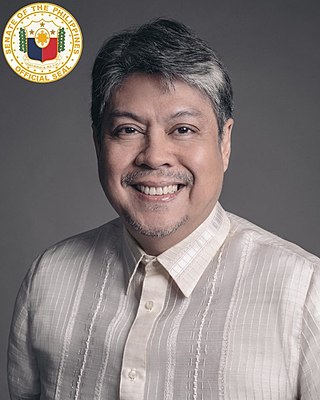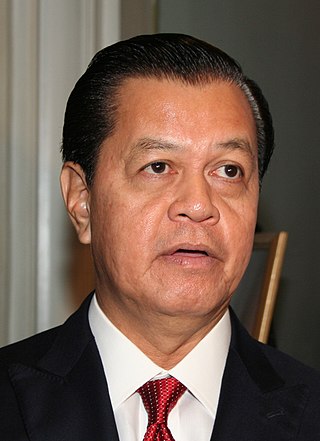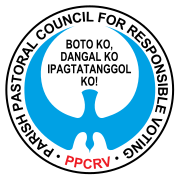
The 2004 Philippine presidential and vice presidential elections were held on Monday, May 10, 2004. In the presidential election, incumbent president Gloria Macapagal Arroyo won a full six-year term as President, with a margin of over one million votes over her leading opponent, movie actor Fernando Poe Jr.

The Catholic Bishops' Conference of the Philippines (CBCP) is the permanent organizational assembly of the Catholic bishops of the Philippines exercising together certain pastoral offices for the Christian faithful of their territory through apostolic plans, programs and projects suited to the circumstances of time and place in accordance with law for the promotion of the greater good offered by the Catholic Church to all people.

Legislative and local elections were held in the Philippines on May 14, 2007. Positions contested included half the seats in the Senate, which are elected for six-year terms, and all the seats in the House of Representatives, who were elected for three-year terms. The duly elected legislators of the 2007 elections joined the elected senators of the 2004 elections to comprise the 14th Congress of the Philippines.

Elections for all positions in the Philippines above the barangay were held on May 10, 2010. The elected president is Benigno Aquino III, the 15th President of the Philippines, succeeding President Gloria Macapagal Arroyo who was barred from seeking re-election due to term restrictions. The successor of Vice-President Noli de Castro is Jejomar Binay, the 13th Vice President of the Philippines. The legislators elected in the 2010 elections joined the senators of the 2007 elections and comprised the 15th Congress of the Philippines.

The 2010 Philippine presidential and vice presidential elections were held on Monday, May 10, 2010. The ruling President of the Philippines, Gloria Macapagal Arroyo, was ineligible to seek re-election as per the 1987 Constitution, thus necessitating an election to select the 15th President.

The 2010 election of members to the Senate of the Philippines was the 30th election to the Senate of the Philippines. It was held on Monday, May 10, 2010, to elect 12 of the 24 seats in the Senate. The winners in this election joined the winners of the 2007 election to form the 15th Congress of the Philippines. The senators elected in 2007 will serve until June 30, 2013, while the senators elected in this election will serve up to June 30, 2016. The 2010 presidential election, elections to the House of Representatives as well as local elections occurred on the same date. The Philippines uses plurality-at-large voting for seats in the Senate: the twelve candidates with the highest number of votes wins the twelve seats up for election.

The 2010 House of Representatives of the Philippines party-list election was on May 10, 2010. The whole country was one at-large district, where parties nominate three persons to be their candidates, ranked in order of which they'll be seated if elected. The elected representatives will serve in the 15th Congress.
Local elections were held in Marilao, Bulacan, on May 10, 2010, within the Philippine general election. The voters (Marileños) will elect for the elective local posts in the municipality: the mayor, vice mayor, and eight councilors.

The 2007 election of members to the Senate of the Philippines was the 29th election to the Senate of the Philippines. It was held on Monday, May 14, 2007, to elect 12 of the 24 seats in the Senate. The winners in this election joined the winners of the 2004 election to form the 14th Congress of the Philippines. The senators elected in 2004 will serve until June 30, 2010, while the senators elected in this election will serve up to June 30, 2013. The elections to the House of Representatives as well as local elections occurred on the same date. The Philippines uses plurality-at-large voting for seats in the Senate.

Presidential elections, legislative elections and local elections were held in the Philippines on May 10, 2004. In the presidential election, incumbent president Gloria Macapagal Arroyo won a full six-year term as president, with a margin of just over one million votes over her leading opponent, highly popular movie actor Fernando Poe Jr.

A special election for Ilocos Sur's 1st district seat in the House of Representatives of the Philippines was held on May 28, 2011. The special election was called after incumbent representative Ronald Singson resigned on March 7, 2011, after being convicted of drug possession by the Wan Chai District Court in Hong Kong. Vigan vice mayor Ryan Luis Singson, the former representative's brother, won the election and shall serve the remainder of his brother's term which will end on June 30, 2013.
Local elections were held in Calamba, Laguna, on May 13, 2013, within the Philippine general election, for posts of the mayor, vice mayor and ten councillors.
The province of Tarlac held local elections on Monday, May 13, 2013, as a part of the 2013 Philippine general election. Voters selected candidates for all local positions: a town mayor, vice mayor and town councilors, as well as members of the Sangguniang Panlalawigan, the vice-governor, governor and representatives for the three districts of Tarlac.
Local elections held in Iligan City on May 13, 2013 within the Philippine general election. The resident voters elected for the elective local posts in the city: the mayor, vice mayor, the one congressman, and twelve councilors. Each official is elected publicly to a 3-year term and can be re-elected up to 3 terms in succession.
Tarlac City held local elections on May 13, 2013, within the Philippine general election. The voters elected candidates for mayor, vice mayor, and ten councilors. Incumbent mayor Gelacio Manalang won the elections, securing him to serve his second three-year term as the mayor of Tarlac City. Manalang defeated former mayor Genaro Mendoza, former city administrator and health officer Jerome Lapeña, and incumbent 2nd district provincial board member Danilo Asiaten.
Local elections in Siquijor held on May 9, 2016 as part of the 2016 Philippine general election. Voters elected all local posts in the province: a town mayor, vice mayor, town councilors, as well as members of the Sangguniang Panlalawigan - three in each of the province's two administrative districts, the governor, vice governor, and one representative for lone district of Siquijor.
Election will be held in Autonomous Region in Muslim Mindanao for seats in the House of Representatives of the Philippines on May 9, 2016.
Since the 2008 Autonomous Region in Muslim Mindanao general election, the voters in the Philippines have to shade the oval that was indicated before the candidate's name, and a voting machine manufactured by Smartmatic automatically counts each ballot as it is fed into it. The results are then printed as the election return and sent electronically to the city or municipal Board of Canvassers.
Local elections in Siquijor were held on May 13, 2019 as part of the 2019 Philippine general election. Voters elected all local posts in the province: town mayors, vice mayors, town councilors, as well as members of the Sangguniang Panlalawigan - three in each of the province's two administrative districts, the governor, vice governor, and one representative for lone district of Siquijor.










